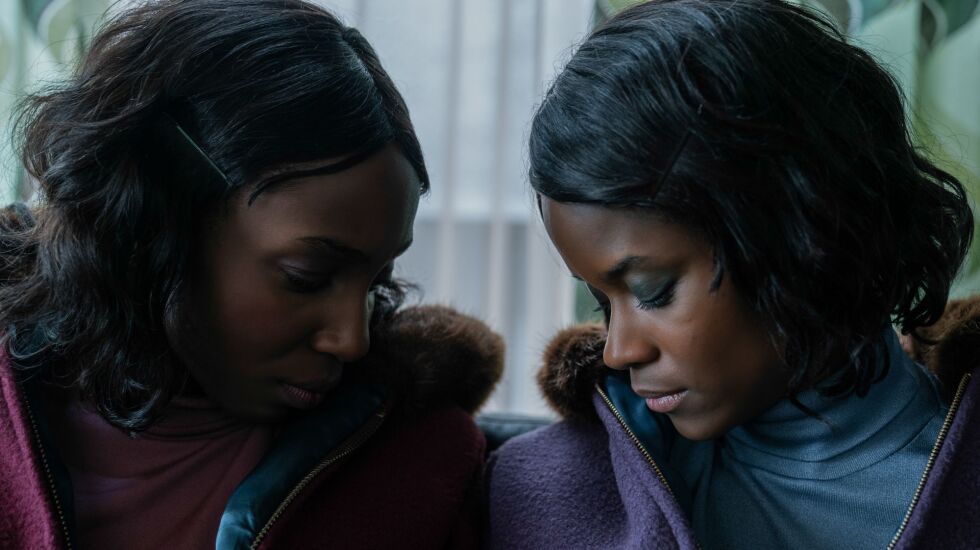
The putatively bold and experimental but ultimately dour and cold “The Silent Twins” tells the story of a pair of Beautiful Minds in deliberately unattractive fashion, almost daring the audience to remain invested in the true-life story of Jennifer and June Gibbons, identical twins in Wales who had a special way of communicating between themselves but would fall into a kind of choreographed silence whenever another person entered their world.
As much as I admired the performances by Eva-Arianna Baxter and Leah Mondesir-Simmonds as the girls as children, and Letitia Wright and Tamara Lawrance as Jennifer and June in their late teens and through their 20s, I was turned off by the Polish director Agnieszka Smoczyńska’s self-indulgent and often grotesque imagery, which becomes increasingly off-putting. The story becomes more about stylistic flourishes than digging deep into the mistreatment suffered by June and Jennifer at the hands of a system and a society that didn’t know what to do with them and how to accept them, and often treated them harshly.
“The Silent Twins” begins in greatly promising fashion, as the voices of 11-year-old June (Mondesir-Simmonds) and Jennifer (Baxter) break the fourth wall while introducing the cast of the film over stop-motion animation graphics. We then see the twin girls in their bedroom sanctuary in Harverfordwest in Wales in the 1970s, where they’re hosting an imaginary radio show filled with witty banter, with pop tunes by the likes of T. Rex sprinkled in. Their world seems filled with joy and color and imagination and spark. However, they immediately fall into mirror images of slumped silence whenever their bubble is burst by the presence of another human being — even their patient but overwhelmed Barbadian immigrant parents (Nadine Marshall and Treva Etienne).
Mirroring each other’s movements, sometimes whispering in each other’s ears, occasionally breaking into violent fights with one another for no apparent reason, June and Jennifer are bullied and mistreated at school, and they fare no better when they’re transferred to a school for children with learning challenges, despite the best efforts of a sympathetic therapist (Michael Smiley).
We flash forward about a decade later, with Letitia Wright now playing June and Tamara Lawrance as Jennifer, and though these two actresses are obviously not biological twins, they do a remarkable job of creating synchronized yet singular characters. When June and Jennifer are ensconced in their room, taking turns writing stories on a manual typewriter and acting out fantasies with handmade puppets, “The Silent Twins” takes big leaps of fancy, filling the screen with bright and cheerful colors, and illustrating the girls’ stories with elaborate musical fantasies or stop-motion storytelling straight out of a horror movie. (One extended tale involves a doctor and his wife who have a baby with a fatal heart condition — so the doctor performs a heart transplant involving the family dog. It’s even uglier and more bizarre than it sounds.)
The young women decide they’ll have to experience life to really be able to write about it, but they go about it in all the wrong ways. They hook up with an American jock named Wayne (Jack Bandeira), an oafish lout who takes advantage of them sexually and introduces them to smoking pot and huffing chemicals. (Whereas the girls’ parents are well-intentioned but overmatched, this guy’s mom and dad are neglectful idiots.)
Director Smoczyńska continues to careen wildly between styles; we get elaborate musical numbers with songs that are far too literal in their interpretation of events, rosy fantasy sequences reflecting the naïve optimism the twins sometimes feel — and then we’re plunged back into the harsh and often horrific reality of their lives, which is conveyed in ghastly and sickly tones.
After going on a crime spree that includes drug abuse, theft and arson, the twins are sentenced to an indefinite stay at Broadmoor Hospital in Crowthorne, a high-security facility where they’re treated like irredeemable career criminals, with the staff making little or no effort to understand them, to work with them, to encourage their creativity and try to help them with their difficulties. It’s a bleak and terrible life. A ray of hope arrives when the Sunday Times journalist Marjorie Wallace (Jodhi May) takes an interest in their story and champions their cause, but by then June and particularly Jennifer have fallen into deep, dual depression and have been separated after yet another vicious confrontation with one another.
We’re told many of the animated and musical sequences are inspired by the works of June and Jennifer, and those sequences indicate a wealth of imagination but also some deeply troubled minds that were left to atrophy for years, with the conventional world incapable and/or unwilling to help. For all its stylistic flourishes, “The Silent Twins” winds up a relatively superficial entry in the genre of mental health biopics.







